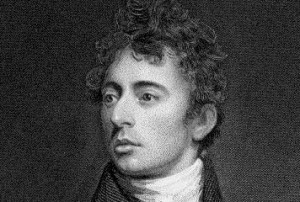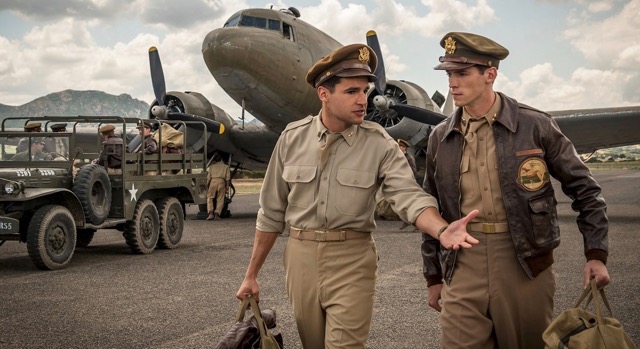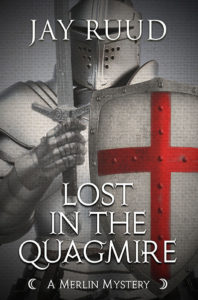Catch-22
Hulu (2019)

Okay, I know this is my week to review a book, but I’m putting a bit of a twist on it and reviewing a currently streaming miniseries made from a book. And not just a book: the novel that in my own humble (well, not all that humble) opinion is the greatest American novel since World War II. This is a book that, despite its difficulty as a kind of quintessential post-modern novel, has sold well over ten million copies worldwide. It was Heller’s first novel, and when, after several subsequent books, people would still comment that he’d never written anything else as good as Catch-22, Heller would shrug and say, “Who has?” And indeed he was justified in doing so.
And yet right now, after the airing of the recent six-part dramatization of the novel on Hulu, I’m virtually certain that Joseph Heller is rolling over in his grave.
It had begun with so much promise. George Clooney, who has never concerned himself with productions of mediocre quality, and never one to pull his punches in productions with political implications, was behind the production. And it looked great: The recreation of the period clothing and weaponry, the Italian landscape and the feel of flying through flak bursting around your plane on bombing missions over Italy are all top notch.
But none of that really matters. The ultimate product that reaches the screen is so far removed from the intent and tone of Heller’s novel as to be very nearly a travesty. My high expectations for the series were dampened after the very first episode. Here, two serious problems began to emerge: First, the writers (Luke Davies and David Michôd) and directors (Clooney, Grant Heslov and Ellen Kuras) of the series had clearly made the disastrous decision to present the story of the novel chronologically. I can only guess that they assumed it would be too difficult for the viewers to follow if they imitated the structure of the book, but it’s a serious mistake to underestimate your audience. Heller’s novel is structured something like a spiral, the devastating event at the center of the structure is the death of Snowden. Early in the novel, Yossarian asks the confusing question “Where are the Snowdens of yesteryear?” at a military briefing, thereby introducing the motif. The novel circles back to the Snowden incident again and again, until finally, toward the end, the entire story of Snowden’s pathetic death on his first mission, and Yossarian’s futile attempts to comfort him, are revealed. But in the meantime, the scene is played over and over, as if on a loop. In this pale imitation of the novel, Snowden is never mentioned until the final episode. It’s worth noting that Mike Nichols’ 1970 film version of the book, this recursive structure is embraced, as Yossarian keeps returning to the scene that begins “Help him! Help the bombardier!”—a scene repeated several times until the final horrifying death of Snowden. So, it could have been done.
The second serious problem evident from the start is that the creators of this series apparently forgot that the book is comedy. Oh, it’s definitely a very dark comedy—bitter, satiric and condemnatory—but hilariously so. I could not figure out where the somber tone of this rendition was coming from. All I could think of is that maybe the creators hadn’t actually read the book. Clooney as Lieutenant Scheisskopf was the only actor who seemed to realize he was in a comedy. The protagonist Yossarian, played by Christopher Abbott (of It Comes at Night) walks around in a constant state of depression and worry, which is appropriate, but without the frantic energy, and therefore without the humor, that the Yossarian of the novel exudes. Again, in Nichols’ film, Yossarian is played by a frenetic Alan Arkin, whose manic attempts to get out of flying more life-threatening missions imposed on him by his clueless and incompetent commanding officer, Colonel Cathcart, form the main action of the story. Cathcart and his second-in-command Colonel Korn, played here by Kyle Chandler and Kevin J. O’Connor, are definitely dangerous but far less comic than they are in Heller’s book. Their deal to let Yossarian go home if he tells people he “likes them” is not in this version—though again, in the Nichols movie the two of them, played hilariously by Martin Balsam and Buck Henry, strike a tone that perfectly reflects the novel (perhaps the fact that Henry, a comic writer who had earlier penned Nichols’ The Graduate, wrote the adapted screenplay for this film explains its appropriate tone).
And that’s just the first episode. For the sake of brevity let me focus on just three more of the myriad problems with this adaptation. First, there is the conclusion. I suppose this is technically a spoiler, but if you’ve read the book you deserve to know this, and if you haven’t, well, you deserve to know just how far the conclusion of this series deviates from Heller’s novel. In the novel, Yossarian’s tent-mate, the pilot Orr, has to ditch his plane and bail out on every mission, yet he still repeatedly asks Yossarian to fly with him on his next mission. Finally he goes down and isn’t heard from again, and everyone thinks he is lost, until word comes that Orr has turned up in neutral Sweden, having rowed there after going down, and has thus escaped from the officers (Cathcart and Korn) who have been doing their best to kill him. (The enemy, Yossarian has already made clear, is anybody who is trying to kill you, including your own incompetent and rapacious officers). When Yossarian learns of Orr’s escape he is emboldened to make his own getaway, and is last seen bolting in an attempt to make it to Sweden and safety. In the current rendering of the story, Orr doesn’t pester Yossarian to fly with him (he asks him once), and when he makes it to Sweden, Yossarian is glad to know he’s alive, but takes no inspiration from his escape, and is last seen…flying more missions, with a kind of dazed look on his face. Good lord, what is going on here?
Then there’s the whole business of Nately’s whore. Yossarian’s naïve young friend Nately (played here by Austin Stowell from TV’s The Secret Life of an American Teenager) is in love with an Italian sex worker (who treats him shabbily) and wants to marry her. But Nately is killed on a bombing mission, and the woman inexplicably blames Yossarian for Nately’s death, and waits for him time and again to try to kill him in revenge. The very last image in the book is of Yossarian jumping to avoid the lunging knife of Nately’s whore coming down at him like the inexorable hand of fate. Her murderous schemes against Yossarian are completely absent from this tepid adaptation. Clearly Heller thought the motif of her sudden unforeseen attacks important—as a metaphor of everything in life that’s out to get you, or perhaps as a representation of an existential guilt that we share in with regard to all innocent deaths that we did nothing to prevent. In any case, it ain’t there in this version.
But the absolute worst betrayal of Heller’s novel is the whitewashing of Milo Minderbinder that takes place in this adaptation. Heller’s 1961 novel was published very shortly after President Eisenhower’s warning to the nation in his farewell address to beware of the military-industrial complex. Eisenhower left citizens with a dire warning about “the immense military establishment” that had joined together with “a large arms industry” in a mutually beneficial relationship that he called a threat to democratic government. Heller’s Catch-22 depicts just such an unholy alliance in which Milo, the pure capitalist, gets rich, and helps Cathcart and Korn to get rich as well, by using the unquestioned demands of the military to line their own pockets while making the perpetual military an end in itself and finding every means possible to make a profit from it. In the book, Milo steals the officers’ parachutes because he found a way to make a profit selling the silk. He tries to get Yossarian to eat chocolate covered cotton balls because he doesn’t want to take a loss on the Egyptian cotton crop he’s bought. And he makes a deal that allows German planes to strafe his own base in exchange for profits for himself and his commanding officers. In Hulu’s production, Milo (played by Daniel David Stewart) is presented as a rather likeable go-getter, just a smart young businessman on the rise, who is Yossarian’s good friend who wants Yossarian to come and work for him, assuming he survives the war. The producers have kept only the strafing incident, but present it in such a way that Milo has been very careful to make sure that nobody gets hurt. Essentially, this series whitewashes the military-industrial complex—and this in the wake of America’s twenty-first century wars that have made huge profits for companies like Haliburton. Why on earth would they do this? I think maybe Ike himself is joining Heller in rolling over in his grave.
It seems as if the creators of this Catch-22 have sought to make a version of Heller’s book that didn’t offend anybody—an idea more absurd than anything in the novel. Accordingly, the character of Chaplain Tappman, for example, is all but written out of the story: In the novel, the Chaplain, though ineffectual, does his best to convince Colonel Cathcart that raising the number of missions the men have to fly, risking their lives merely for the colonel’s own glorification, is morally wrong. In this version, he’s merely somebody for Yossarian to open up to occasionally. The idea that a Christian pastor would call the U.S. Army morally culpable was apparently too much for the producers. It might upset Christians! It might upset colonels! Perhaps the single most obvious sellout occurs during Yossarian’s nightmarish exploration of Rome, the Eternal City, at night. In the book, Yossarian hears a cry of “Help! Police!” and runs to try to rescue the victim. When he arrives at the scene, he finds the police beating someone up: The cry was not a call to the police for help, but a cry of police brutality. The series’ producers seem to have chosen to avoid what could have been a controversial scene in the wake of “Black Lives Matter.” But for Heller, it was just another example of those in power using their position to deliberately harm the powerless—and to pretend, like Milo, that it’s for their own good. The only answer in Heller’s nightmare world is escape, to follow Orr to Sweden. That’s what Heller wants Yossarian to do. And that’s what the producers of this toothless series will not let him do.
The novel, which you should read, is worth four Shakespeares. This series, which you should miss, gets one Southey.
Just named a finalist for the INDIE award for best Mystery novel of the year:
Jay Ruud’s most recent novel, Lost in the Quagmire: The Quest of the Grail, IS NOW a finalist for this year’s INDIE award for books by independent publishers. You can order your copy direct from the publisher (Encircle Press) at http://encirclepub.com/product/lost-in-the-quagmire/You can also order an electronic version from Smashwords at https://www.smashwords.com/books/view/814922
When Sir Galahad arrives in Camelot to fulfill his destiny, the presence of Lancelot’s illegitimate son disturbs Queen Guinevere. But the young knight’s vision of the Holy Grail at Pentecost inspires the entire fellowship of the Round Table to rush off in quest of Christendom’s most holy relic. But as the quest gets under way, Sir Gawain and Sir Ywain are both seriously wounded, and Sir Safer and Sir Ironside are killed by a mysterious White Knight, who claims to impose rules upon the quest. And this is just the beginning. When knight after knight turns up dead or gravely wounded, sometimes at the hands of their fellow knights, Gildas and Merlin begin to suspect some sinister force behind the Grail madness, bent on nothing less than the destruction of Arthur and his table. They begin their own quest: to find the conspirator or conspirators behind the deaths of Arthur’s good knights. Is it the king’s enigmatic sister Morgan la Fay? Could it be Arthur’s own bastard Sir Mordred, hoping to seize the throne for himself? Or is it some darker, older grievance against the king that cries out for vengeance? Before Merlin and Gildas are through, they are destined to lose a number of close comrades, and Gildas finds himself finally forced to prove his worth as a potential knight, facing down an armed and mounted enemy with nothing less than the lives of Merlin and his master Sir Gareth at stake.
Order from Amazon here: https://www.amazon.com/Lost-Quagmire-Quest-Merlin-Mystery/dp/1948338122
Order from Barnes and Noble here: https://www.barnesandnoble.com/w/lost-in-the-quagmire-jay-ruud/1128692499?ean=9781948338127


